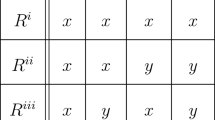Abstract
We characterize which scoring rules are Maskin-monotonic for each social choice problem as a function of the number of agents and the number of alternatives. We show that a scoring rule is Maskin-monotonic if and only if it satisfies a certain unanimity condition. Since scoring rules are neutral, Maskin-monotonicity turns out to be equivalent to Nash-implementability within the class of scoring rules. We propose a class of mechanisms such that each Nash-implementable scoring rule can be implemented via a mechanism in that class. Moreover, we investigate the class of generalized scoring rules and show that with a restriction on score vectors, our results for the standard case are still valid.
Similar content being viewed by others
References
Borda JC (1781) Memoire sur les elections au scrutiny. Historoire de lAcademie Royals des Sciences, Paris
Doğan B, Koray S (2007) Explorations on monotonicity in social choice theory. Bilkent University, Mimeo
Erdem O, Sanver R (2005) Minimal monotonic extensions of scoring rules. Soc Choice Welf 25:31–42
Maskin E (1977) Nash equilibrium and welfare optimality. MIT, Cambridge
Moulin H (1983) The strategy of social choice. North-Holland, Amsterdam
Muller E, Satterthwaite M (1977) The equivalence of strong positive association and strategy-proofness. J Econ Theory 14:412–418
Peleg B (1984) Game theoretic analysis of voting in committees. Cambridge University Press, Cambridge
Puppe C, Tasnádi A (2008) Nash implementable domains for the borda count. Soc Choice Welf 31:367–392
Sen A (1995) The implementation of social choice functions via social choice correspondences; a general formulation and a limit result. Soc Choice Welf 12:277–292
Young HP (1974) An axiomatization of Borda’s rule. J Econ Theory 9:43–52
Young HP (1975) Social choice scoring functions. SIAM J Appl Math 28:824–838
Acknowledgments
We would like to thank William Thomson and an anonymous referee for their careful reading of the paper and many helpful comments.
Author information
Authors and Affiliations
Corresponding author
Rights and permissions
About this article
Cite this article
Doğan, B., Koray, S. Maskin-monotonic scoring rules. Soc Choice Welf 44, 423–432 (2015). https://doi.org/10.1007/s00355-014-0835-6
Received:
Accepted:
Published:
Issue Date:
DOI: https://doi.org/10.1007/s00355-014-0835-6



